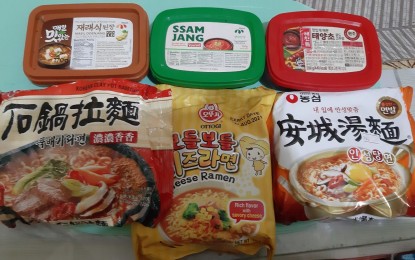
(File photo)
MANILA – A consumer group on Friday urged the government to strictly implement rules and regulations on imported products, especially food and farm produce, so as not to put the consumers’ health at risk.
Laban Konsyumer, Inc. (LKI) president Victorio Mario Dimagiba, who is a former trade undersecretary, told the Philippine News Agency (PNA) that the government is quite “relaxed” in enforcing import rules.
Dimagiba shared the sentiments of trade and food safety expert Jhunafe Ruanto, who expressed concern over imported food products being sold in the market even though they lack English or Filipino translations in their labels.
The Department of Trade and Industry (DTI) requires proper labeling of imported products, which must bear English or Filipino translations of their contents.
In a forum early this week, Ruanto warned consumers against buying products with no English or Filipino translation in their labels, saying they could be smuggled goods that do not meet the safety standards of the Philippine government.
Dimagiba said these goods should not be in the market as the Food and Drug Administration (FDA) would not issue them product registration unless they are properly labeled.
Ruanto, who is also a member of the advocacy group Tugon Kabuhayan, pointed out that it is easier for imported food and agricultural produce to enter the Philippine market than for Philippine exports to enter other countries.
Always check the label
She also cautioned consumers about products coming from China and South Korea, particularly noodles, with no English or Filipino translation in their labels.
Emerson Españo, 28, is fond of buying imported Chinese and Korean food and condiments, such as hoisin sauce, chili sauce, ramyun (noodles), kimchi, and bean paste.
Españo told PNA that the translation reassures him that imported products are safe to consume.
Carlos Laron likewise reads labels of imported goods before buying them.
“I always check the label. It’s important to know what you’re buying. If there’s no English translation available on the label, I search the brand on Google and see how the products work or the contents of the food item. I will not buy anything that has no translation unless someone I know recommends it to me or tells me what it’s for,” Laron said.
Ma. Francesca Viray, Danice Viray, and Gladys Gale Limlingan, all from Bulacan, also purchase Korean food and beauty products, as well as Chinese condiments.
For them, labels with no translation are not a big deal when buying imported products.
They said when they are in doubt, they check with their friends or the Internet.
For a parent like Emmy Felix, it is important to always check the label of the products she is buying.
“I always check the label or search online if I’m not familiar with the brand,” Felix said. “As a mom, it’s important to have accurate translation in all products, especially if these are consumables.” (PNA)
